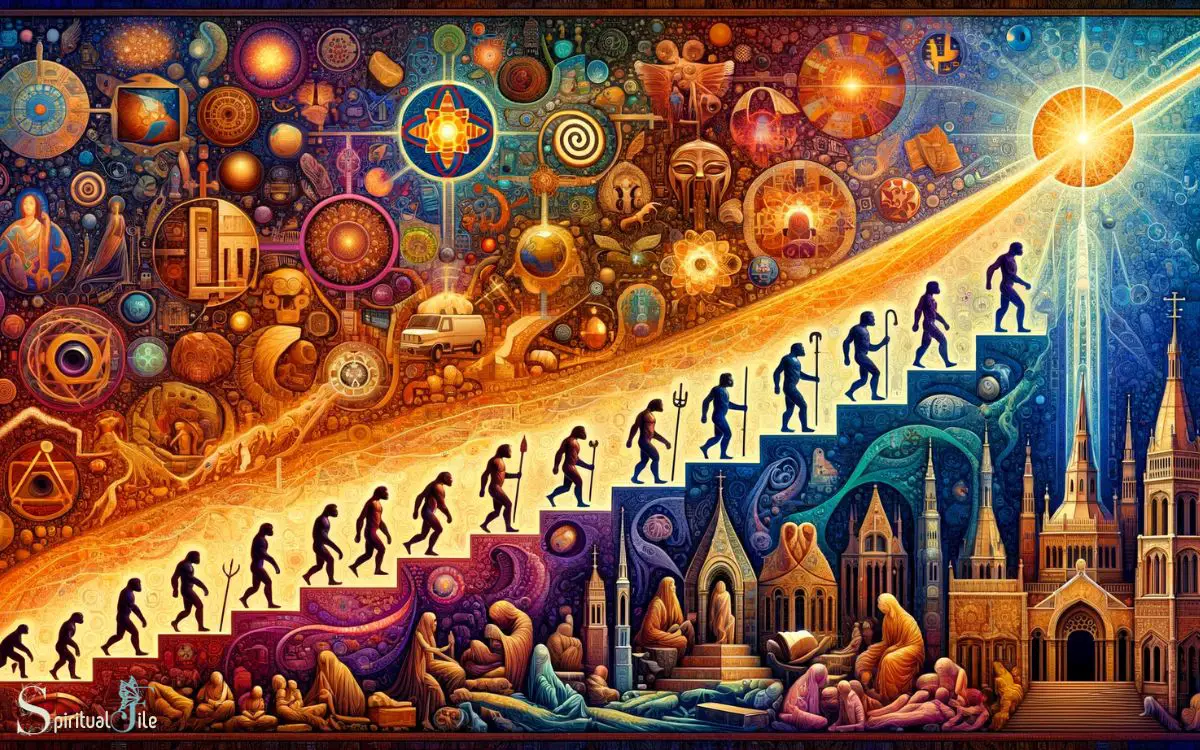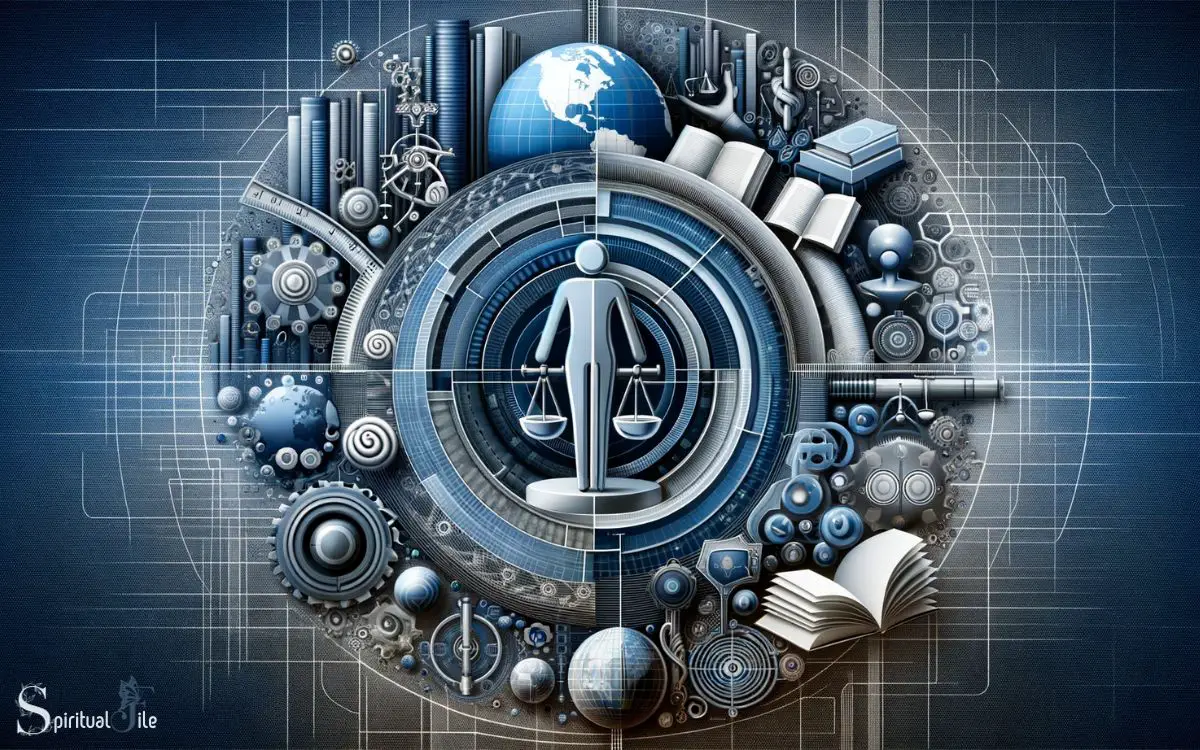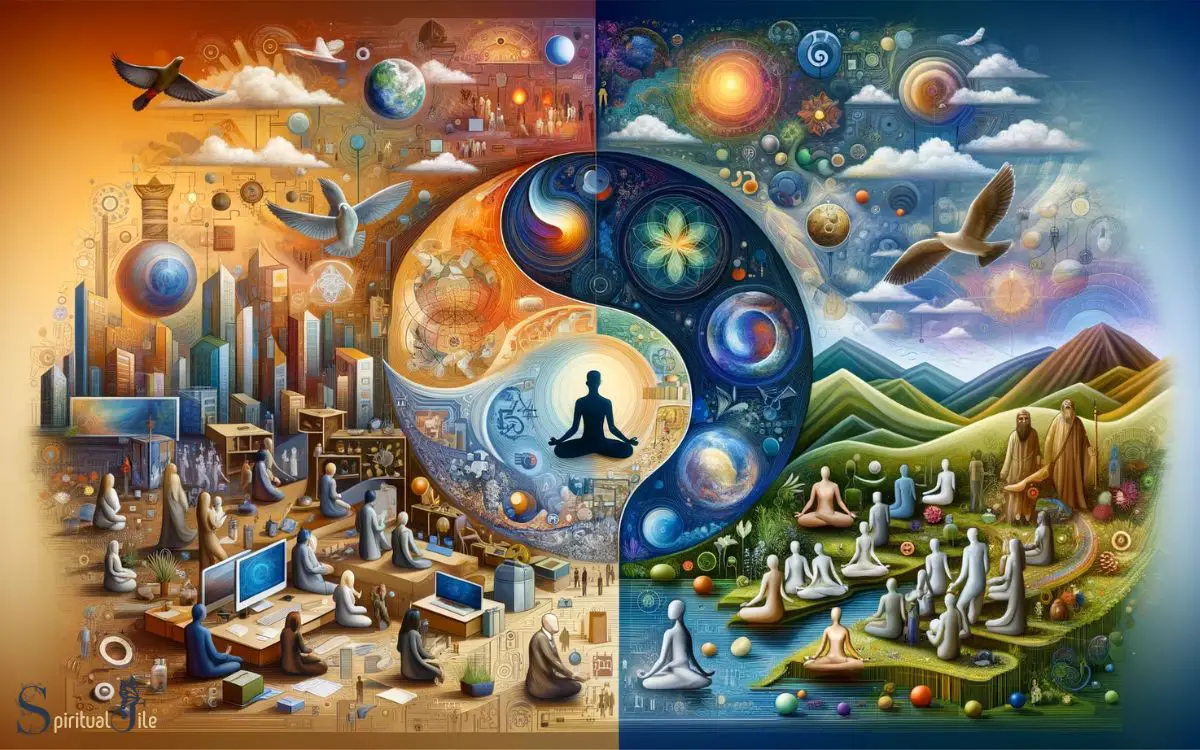Secular Vs Spiritual Values: Ethics!
Secular values are grounded in worldly concepts and human reasoning, focusing on ideas such as reason, ethics, and moral principles that are independent of religious doctrine.
Spiritual values, on the other hand, are based on religious or spiritual beliefs and tend to emphasize a connection to something greater than oneself, such as a deity or the universe. Both sets of values play significant roles in shaping individual behaviors and societal norms.
Secular values often arise from a collective understanding of human experience and rational thought. They include the principles of democracy, human rights, equality, and the rule of law.
Spiritual values, in contrast, are derived from religious teachings and spiritual traditions, focusing on faith, divine guidance, and the pursuit of enlightenment or salvation. Examples of spiritual values include compassion, forgiveness, and the belief in an afterlife.
- Secular Values: Reason, Ethics, Equality, Rule of Law
- Spiritual Values: Faith, Compassion, Enlightenment, Afterlife
Understanding secular versus spiritual values is crucial in a diverse society, where harmonizing these elements is key to fostering mutual respect and coexistence.

Key Takeaway
7 Aspects: Secular Vs Spiritual Values
| Aspect | Secular Values | Spiritual Values |
|---|---|---|
| Source | Human reason, societal norms | Faith, beliefs, higher power |
| Morality | Often based on societal ethics | Guided by spiritual teachings |
| Purpose | Human flourishing, success | Soul’s journey, divine purpose |
| Ethics | Often utilitarian or deontological | Reflect divine will, karma |
| Materialism | Emphasis on material wealth and progress | Emphasis on inner peace, contentment |
| Relationships | Social and professional connections | Connection with all beings, unity |
| Fulfillment | Achievements, wealth, and happiness | Inner peace, spiritual growth |
Origins of Secular and Spiritual Values

The origins of secular and spiritual values can often be traced back to historical, cultural, and philosophical influences.
Secular values, rooted in the principles of humanism and rationalism, have evolved from the Age of Enlightenment, emphasizing reason, individual rights, and societal progress.
On the other hand, spiritual values are often derived from religious doctrines, ancient wisdom, and metaphysical beliefs, shaping moral codes, purpose, and interconnectedness.
Historical events such as the Renaissance, Reformation, and various cultural movements have also played pivotal roles in shaping these values.
Moreover, philosophical thoughts from renowned thinkers like Plato, Aristotle, and Confucius have contributed to the development of both secular and spiritual value systems.
Understanding the roots of these values can provide insights into their significance and enduring impact on societies.
Core Principles of Secular Values

When and how do secular values prioritize individual autonomy and societal progress? Secular values prioritize individual autonomy by advocating for personal freedom, self-determination, and the right to make choices without interference from religious or governmental entities.
Societal progress is advanced through secular values by promoting equality, justice, and the betterment of human welfare through scientific and evidence-based approaches.
| Individual Autonomy | Societal Progress |
|---|---|
| Personal freedom | Equality |
| Self-determination | Justice |
| Right to make choices | Human welfare |
Secular values emphasize the importance of individual rights and freedoms while also striving for a fair and just society. These principles form the foundation of secular ethics and guide decision-making in various aspects of life. Now, let’s delve into the core principles of spiritual values.
Core Principles of Spiritual Values

Core principles of spiritual values encompass a holistic approach to moral and ethical guidance. These principles often revolve around concepts such as compassion, empathy, love, forgiveness, and interconnectedness.
Spiritual values emphasize the importance of inner peace, altruism, integrity, and the well-being of all living beings.
They promote the idea of serving others and living in harmony with nature and the universe. Spirituality encourages individuals to seek a deeper understanding of themselves and their purpose, often through practices such as meditation, prayer, and self-reflection.
It emphasizes the significance of treating others with kindness and respect, regardless of differences.
These core principles of spiritual values provide a framework for individuals to lead a meaningful and purposeful life, guided by a sense of interconnectedness and empathy.
This holistic approach to moral and ethical guidance often leads to conflicts and tensions between spiritual and secular values.
Conflicts and Tensions Between the Two

The clash between secular and spiritual values often leads to conflicts in moral compass and ethical decision-making.
These tensions can arise when societal norms based on secular principles conflict with the spiritual values upheld by individuals or groups.
Understanding and navigating these clashes is essential for fostering harmony and mutual respect in diverse communities.
Moral Compass Divergence
Conflicts and tensions between secular and spiritual moral compasses reveal fundamental divergences in ethical perspectives.
Secular values often prioritize individual autonomy, rationality, and societal consensus when determining moral standards.
In contrast, spiritual values are often rooted in religious teachings, divine commandments, and a belief in transcendental realities, shaping moral principles.
The clashes arise when these differing belief systems intersect in societal and personal decision-making.
For example, issues such as abortion, LGBTQ+ rights, and end-of-life care often spark intense debates, with secular perspectives emphasizing personal freedoms and autonomy, while spiritual perspectives may prioritize the sanctity of life and adherence to religious doctrine.
These conflicts highlight the challenge of reconciling divergent moral compasses in a pluralistic society, necessitating respectful dialogue and understanding to navigate these tensions.
Ethical Decision-Making Clashes
Frequently, clashes between secular and spiritual ethical perspectives arise in societal and personal decision-making, revealing fundamental divergences in ethical viewpoints.
This clash can lead to tensions and conflicts, as individuals navigate their way through complex ethical dilemmas.
The following list illustrates some common scenarios where clashes between secular and spiritual ethical values may occur:
- Workplace ethics: Differences in ethical standards may arise when secular organizational policies conflict with an individual’s spiritual beliefs.
- Medical decision-making: End-of-life care and treatment options may clash with spiritual beliefs about the sanctity of life.
- Environmental ethics: Secular views on resource usage and conservation may clash with spiritual beliefs regarding stewardship of the Earth.
- Social justice issues: Secular perspectives on equality and rights may conflict with spiritual teachings on compassion and charity.
Integrating Secular and Spiritual Values

Integrating secular and spiritual values requires a thoughtful approach that acknowledges the complexities of belief systems and societal norms.
It is essential to recognize that individuals hold diverse perspectives shaped by their cultural, religious, and personal backgrounds.
Finding common ground between secular and spiritual values involves promoting mutual respect and understanding.
One way to achieve this is by emphasizing universal ethical principles such as compassion, integrity, and justice, which are valued across various belief systems.
Additionally, fostering open dialogue and actively listening to different viewpoints can facilitate the integration of secular and spiritual values.
It is crucial to approach this process with sensitivity and empathy, recognizing that individuals may prioritize different value systems based on their experiences and convictions.
Ultimately, integrating secular and spiritual values necessitates a commitment to inclusivity and a willingness to engage in constructive conversations.
Implications for Personal Ethics

In exploring the implications for personal ethics, it is essential to consider the interplay between secular and spiritual values.
This discussion will shed light on how secular ethics in society and spirituality’s influence on moral code can shape an individual’s ethical framework.
Secular Ethics in Society
The integration of secular ethics in society has significant implications for personal values and ethical conduct.
As secular ethics becomes more prevalent, individuals are influenced by the following:
- Individual Autonomy: Secular ethics emphasize personal responsibility and decision-making, encouraging individuals to think critically about their actions and their impact on others.
- Moral Pluralism: With diverse beliefs and values in society, secular ethics promote understanding and respect for different perspectives, fostering a more inclusive and tolerant community.
- Social Justice: Secular ethics advocate for fairness and equality, prompting individuals to consider the well-being of all members of society and take actions to address systemic injustices.
- Ethical Leadership: In a secular society, ethical leaders are expected to uphold principles of integrity, transparency, and accountability, serving as role models for ethical behavior in various domains.
Spirituality and Moral Code
The prevalence of secular ethics in society necessitates a nuanced exploration of the role of spirituality in shaping individuals’ moral code and personal ethics.
Spirituality often provides a foundational framework for moral principles, influencing individuals to cultivate virtues such as compassion, integrity, and empathy.
It offers a broader perspective beyond immediate gratification, emphasizing the interconnectedness of all beings and the importance of altruism.
This spiritual grounding can guide individuals in making ethical decisions, encouraging them to consider the long-term consequences of their actions on themselves and others.
Moreover, spiritual values often transcend cultural and societal norms, providing a universal foundation for ethical behavior.
Therefore, integrating spirituality into personal ethics can foster a deeper sense of responsibility and accountability, contributing to a more compassionate and harmonious society.
Navigating Secular-Spiritual Balance

Navigating the secular-spiritual balance requires thoughtful consideration of individual values and ethical principles.
To achieve this delicate balance, individuals can:
- Reflect on personal beliefs: Take time to introspect and understand one’s own spiritual and secular values.
- Seek guidance: Engage with mentors, spiritual leaders, or trusted individuals to gain insight on how to navigate conflicting values.
- Practice mindfulness: Cultivate a daily practice of mindfulness or meditation to center oneself and align with both secular and spiritual values.
- Act with empathy: Approach situations with empathy and compassion, considering both secular and spiritual perspectives when making decisions or interacting with others.
Are secular and spiritual values compatible, or do they conflict with each other?
Secular and spiritual values often find themselves at odds, as the sinful versus spiritual nature pulls individuals in opposite directions. While secular values focus on material success and individual autonomy, spiritual values emphasize service, humility, and compassion. Finding a balance between the two can be a lifelong journey for many.
Frequently Asked Questions
How Do Secular and Spiritual Values Impact Global Politics and International Relations?
Secular and spiritual values impact global politics and international relations by influencing the ideologies, ethics, and decision-making processes of individuals and societies.
They shape worldviews, priorities, and approaches to governance, diplomacy, and conflict resolution.
What Are the Potential Long-Term Effects of Prioritizing Secular Values Over Spiritual Values in Society?
Prioritizing secular values over spiritual values in society may lead to a decline in moral compass and a focus on materialism. This shift could impact societal cohesion, individual well-being, and the overall sense of purpose.
Are There Specific Cultural or Societal Contexts Where Secular and Spiritual Values Are More Likely to Clash?
In certain cultural or societal contexts, clashes between secular and spiritual values may arise due to differing worldviews, beliefs, and norms.
These conflicts can occur in areas such as governance, education, and moral decision-making.
How Do Individuals Maintain a Sense of Personal Identity and Values When Navigating the Balance Between Secular and Spiritual Principles?
Maintaining a sense of personal identity and values while navigating the balance between secular and spiritual principles requires introspection, open-mindedness, and a willingness to reconcile conflicting beliefs.
Understanding oneself and embracing diversity can foster harmony amidst differing ideologies.
What Role Do Secular and Spiritual Values Play in Addressing Environmental and Sustainability Issues?
Secular and spiritual values both contribute to addressing environmental and sustainability issues.
Secular values often focus on scientific approaches, while spiritual values emphasize interconnectedness and stewardship. Integrating these perspectives can lead to holistic solutions.
Conclusion
In the eternal struggle between secular and spiritual values, it is ironic that both are fundamentally rooted in the human pursuit of meaning and purpose.
While conflicts and tensions may arise, integrating these values can lead to a balanced and enriched ethical framework.
Navigating the balance between the two is a perpetual challenge, but it is in this tension that individuals can find deeper understanding and fulfillment.






